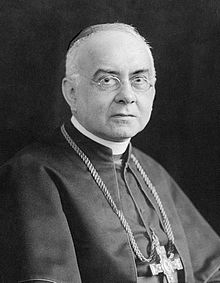Felix von Hartmann
|
His Eminence Felix von Hartmann |
|
|---|---|
| Cardinal, Archbishop of Cologne | |
 |
|
| Church | Roman Catholic |
| Archdiocese | Cologne |
| Installed | 19 April 1913 |
| Term ended | 11 November 1919 |
| Predecessor | Anton Hubert Fischer |
| Successor | Karl Joseph Schulte |
| Other posts | Cardinal-Priest of San Giovanni a Porta Latina |
| Orders | |
| Ordination | 19 December 1874 |
| Consecration | 26 October 1911 |
| Created Cardinal | 25 May 1914 by Pius X |
| Rank | Cardinal-Priest |
| Personal details | |
| Born |
15 December 1851 Münster Germany |
| Died | 11 November 1919 (aged 67) Cologne Germany |
| Buried | Cologne Cathedral |
| Nationality | German |
| Parents | Albert von Hartmann |
| Previous post | Bishop of Münster (1911–1912) |
| Coat of arms |  |
Felix von Hartmann (15 December 1851 – 11 November 1919) was a German prelate, who was Archbishop of Cologne from 1912 to 1919.
Felix von Hartmann was born in Münster, the child of the second marriage of government official Albert von Hartmann. The family was close to the Westphalian aristocracy and served in a manner similar to the traditional Prussian public servants.
After finishing his courses at Gymnasium Paulinum in Westphalia, he attended the Roman Catholic boarding school Collegium Augustinianum Gaesdonck, where Hermann Dingelstad, later Bishop of Münster, was his teacher. In 1870, he enrolled in a theological school in Westphalia, and on 19 December 1874, he was ordained a priest. Because the "Kulturkampf" ("culture war") made employment in Germany impossible, he went to Rome, where he became Chaplain of S. Maria dell'Anima, the German church in Rome, and simultaneously started his study of Canon law. In 1877 he earned the title of Dr. jur. can. (doctor of canon law) and returned to Westphalia in 1879, where he became chaplain in the parishes of Havixbeck and Emmerich.
In 1890, he became secretary and chaplain to Dingelstad, by this time Bishop of Münster. He rose through the ranks of the Church, serving as counselor of the episcopal curia of Münich, 1895–1905; canon of the cathedral chapter of Münster, 1903–1905; vicar general of Münster, 30 October 1905–1911; dean of the chapter and vicar capitular, 1910; and protonotary apostolic ad instar participantium, 20 December 1907.
He was prepared, on the basis of royal nomination, to be promoted to the episcopate of Münster, where he was promoted to dean in 1911. Having great influence on church politics, because the Bishop trusted him completely, he had a certain view concerning the reformation of Catholicism, which even later he never gave up. Because his influence was well known, his election to the bishopric of Münster on 6 June 1911 surprised no one. Despite the royal government's disapproval of his ultramontane views it was impressed by his wise and polite ways, his excellent manners as well as his noble descent. His papal confirmation followed on 27 July and his ordination as bishop by the archbishop of Cologne, Anton Fischer, on 26 October in Münster.
...
Wikipedia
